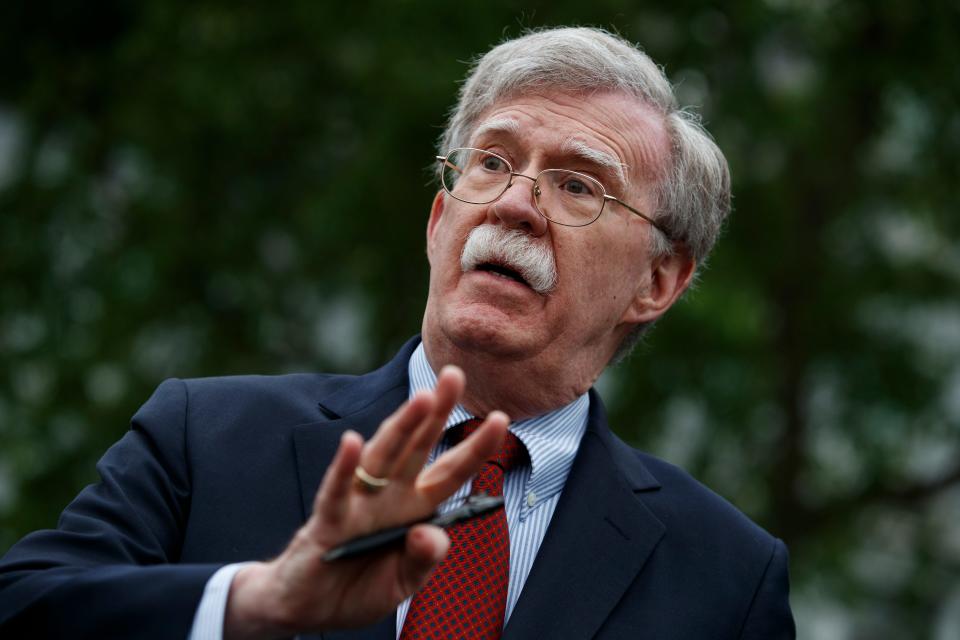Plot to kill John Bolton: US sanctions Iranian officials, cites assassination efforts against Trump officials
- Oops!Something went wrong.Please try again later.
- Oops!Something went wrong.Please try again later.
- Oops!Something went wrong.Please try again later.
WASHINGTON -- The Treasury Department imposed sanctions Thursday on members and affiliates of Iran’s Islamic Revolutionary Guard Corps that it says have engaged in plots to kill former national security adviser John Bolton, other former U.S. government official and anti-Tehran activists around the world.
The designations by Treasury’s Office of Foreign Assets Control, or OFAC, did not mention any of the former U.S. officials by name, saying only that those designated "have participated in a series of terrorist plots including assassination plots targeting former United States government officials, dual U.S. and Iranian nationals, and Iranian dissidents."
But one of the Iranians sanctioned Thursday, Revolutionary Guard official Shahram Poursafi, was charged by the Justice Department last August with attempting to orchestrate a murder-for-hire plot against Bolton beginning in early November 2021.
A former senior U.S. official told USA TODAY on Thursday that other former Trump-era officials cited by Treasury as being targeted by Iran likely include former Secretary of State Mike Pompeo, former Defense Secretary Mark Esper and Brian Hook, the former U.S. Special Representative for Iran.
More: Iranian national charged in assassination plot targeting Trump national security adviser John Bolton
The former official, who spoke on the condition of anonymity to discuss the ongoing security threats, said he has been briefed by federal authorities about ongoing Iranian efforts to target and assassinate those Trump administration leaders because it believes they were responsible for the 2020 U.S. military strike in Baghdad that killed Gen. Qasem Soleimani, the commander of the Revolutionary Guard’s elite Quds Force.
General Kenneth McKenzie, Jr., the commander of U.S. Central Command from 2019 to 2022, is also being targeted by Iran for his suspected role in the Soleimani strike, the former U.S. official said, citing confidential U.S. security briefings he has received on the threat.
"Imminent and sinister attacks" on Americans
Then-President Donald Trump said in January 2020 that he ordered the military strike on Soleimani because he was plotting "imminent and sinister attacks" on American diplomats and military personnel. Afterward, Iran’s religious leaders publicly vowed to retaliate at a time and place of their choosing.
“The United States remains focused on disrupting plots by the IRGC and its Qods Force, both of which have engaged in numerous attempts and other acts of violence and intimidation against those they deem enemies of the Iranian regime,” said Brian Nelson, Treasury’s undersecretary for Terrorism and Financial Intelligence, in a statement about the new sanctions.
Bolton hailed the Treasury sanctions on Thursday but said nothing will stop Iran or the IRGC from continuing to try to assassinate the political leaders of its adversaries until the religious establishment in Tehran is replaced.
“I think the ayatollahs have demonstrated that by the way they treat their own people, not to mention their pursuing nuclear weapons and supporting terrorism around the world,” Bolton told USA TODAY. "So the U.S. is only going to be safe when that regime falls.”
More: Trump: Iran's Soleimani was plotting 'imminent' attacks on diplomats, soldiers before US killed him
Bolton said he is under 24 hours a day, seven days a week Secret Service protection because of the ongoing threat.
A call to Iran’s mission at the United Nations seeking comment was not returned.
Iran carrying out "more bold and aggressive plots"
Matthew Levitt, a former FBI and Treasury official counterterrorism official, said that Iran has engaged in such activities around the world for over 40 years, but that "the pace of such operations has increased significantly. So too has Iran's willingness to carry more bold and aggressive plots, including targeting American citizens and officials here in the United States."
"Coming on the heels of the indictment of Shahram Poursafi, this is another piece of public messaging to expose the activities of the IRGC and its operatives around the world," said Levitt, who has created a database of Iranian external operations at the Washington Institute for Near East Policy.

Quds Force members among those sanctioned
Quds Force official Mohammad Reza Ansari was sanctioned Thursday, Treasury said, for supporting the unit’s covert operations abroad, including planning and conducting intelligence and lethal operations against Iranian dissidents and other non-Iranian nationals in the United States, the Middle East, Europe, and Africa.
Ansari, in league with Poursafi, planned and attempted to assassinate two former U.S. government officials, Treasury said.
When charging him last year, federal prosecutors said Poursafi tried to pay someone in the U.S. $300,000 to kill Bolton, without realizing that his U.S. contact was actually an informant for the U.S. government.
Others sanctioned on Thursday included three people based in Iran and Turkey, a firm linked to the Quds Force and two senior officials of Iran’s Intelligence Organization, the Treasury Department said.
Besides Bolton, it said the targets included other unnamed former U.S. officials, Iranian dissidents abroad and journalists.
The sanctions imposed Thursday were authorized under Executive Order (E.O.) 13224, a counterterrorism sanctions authority, as part of the Treasury Department’s ongoing effort to hold Iran accountable for external terrorist plots.
Previous designations include senior officials involved in a 2011 plot to assassinate the Saudi Arabian Ambassador to the United States, individuals involved in planning and executing operations in the Middle East and the United States in 2020, and Iranian intelligence operatives targeting U.S. citizens and dissidents in 2021.
As a result of the sanctions, all property of the designated individuals and entities within the U.S. or in the control of U.S. persons, must be blocked and reported to OFAC. Engaging in certain transactions with them also carries the risk of secondary sanctions, Treasury said.
This article originally appeared on USA TODAY: Treasury blacklists Iranians for alleged US assassination plots

